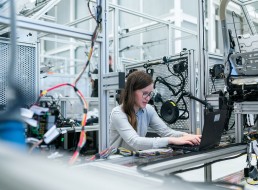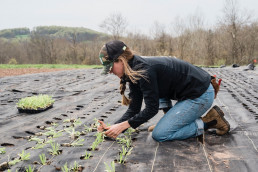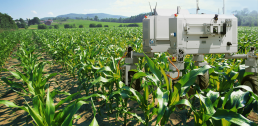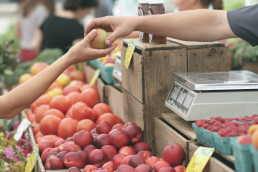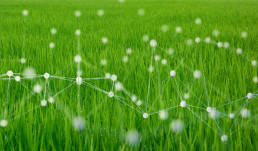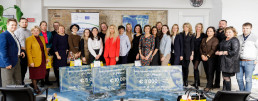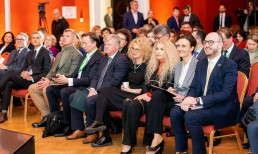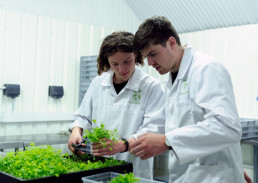Smart Droplets
Smart Droplets - Accelerating the achievement of EU Green Deal Goals for pesticide and fertilizer reduction through AI, data and robotic technologies
About the project:
AI models, data, and autonomous robotic systems in crop management are still in their infancy technologically, lacking a holistic approach that includes both physical and digital resources. The overuse of pesticides and fertilizers is a consequence of traditional spraying methods.
To demonstrate a significant impact on the Green Deal, Smart Droplets introduces autonomous, retrofit tractors with Direct Injection System (DIS) for smart spraying - avoiding farmers' exposure to hazardous chemicals.
Smart Droplets' robotic (physical) assets are seamlessly integrated with the smart components - the digital platform and digital twins - to collect field data and enable real-time execution of spraying tasks.
The main goal of Smart Droplets is to develop both hardware and software capabilities to create a holistic system capable of turning data into meaningful information and delivering effective spray commands. Through specialized training programs targeting users who are not experts in AI, data, and robotic systems, Smart Droplets will leverage synergies with relevant stakeholders and intensify community and capacity building.
Role of AgriFood Lithuania:
Working with a broad range of stakeholders relevant to Smart Droplets, AgriFood Lithuania DIH is mapping the industry landscape and creating a collaborative framework as a leader in ecosystem mapping and training, and contributing to the field deployment and assessment activities of Smart Droplets pilot project partners.
AFL will conduct a comprehensive review of AI, data, robotics, and other programs (DIHs, pilots, data platforms). The review will result in a set of recommendations that will inform the reference architecture for the Autonomous Robotic Spraying System.
Project website: https://smartdroplets.eu/
Project partners:
1 GEOPONIKO PANEPISTIMION ATHINON EL
2 WAGENINGEN UNIVERSITY NL
3 FUNDACIO EURECAT ES
4 FONDACIJA VIZLORE LABS RS
5 FOODSCALE HUB GREECE ASSOCIATION FOR ENTREPREUNERSHIP AND
INNOVATION ASTIKI MI KERDOSKOPIKI ETAIREIA EL
6 AGREENCULTURE FR
7 AgriFood Lithuania DIH LT
8 AGROMA - PETKOS SA EL
9 CLUSTER DE LA MAQUINARIA I DELS MEDIS DE PRODUCCIO AGRICOLA DE
CATALUNYA ES
Grass Ceiling
GRASS CEILING - GENDER EQUALITY IN RURAL AND AGRICULTURAL INNOVATION SYSTEMS
GRASS Ceiling enables women to drive socio-environmental change by developing innovations that respond to socio-environmental challenges and build rural resilience.
The project will empower women to develop and lead socio-environmental innovations in agriculture, rural economies, and rural communities. Women's participation in socio-environmental innovation in agriculture and rural areas is an emerging area in Europe, and GRASS Ceiling will contribute to the development of tools to support this.
With decades of research and practice experience, GRASS Ceiling brings together leading academics with experience in empowering women in agriculture and rural areas.
AgriFood Lithuania DIH, in collaboration with 25 partners from nine different countries, is implementing a project to train 72 rural women and farmers in different regions of Europe in social-ecological innovation. The project will transform the lives of women farmers and rural entrepreneurs by offering them the opportunity to participate in 9 Living Labs in 9 case study countries: Norway, Sweden, Italy, Spain, the Netherlands, Ireland, Scotland (UK), Lithuania and Croatia.
The Living Lab in Lithuania will be located in a rural region that has experienced depopulation due to internal and external migration. Past extensive agricultural practices have severely degraded the environment. As part of the lab, AgriFood Lithuania DIH will study the innovation needs of women on very small farms and rural women developing rural social capital initiatives.
With the support of Member States and the EU, we can make a real difference for women across Europe.
Project Coordinator: Waterford Institute of Technology (WIT) Ireland
Project Partners:
- University of Newcastle Upon Tyne (UNEW) United Kingdom
- Wageningen University (WU) Netherlands
- European Environmental Bureau (EEB) Belgium
- Women Entrepreneurship Platform (WEP) Belgium
- European Association for information on local development (AEIDL) Belgium
- Mediterranean Agronomic Institute Zaragoza (IAMZ-CIHEAM) Spain
- Mediterranean Agronomic Institute Bari (CIHEAM Bari) Italy
- Pisa University (UNIPI) Italy
- Lithuanian Centre for Social Sciences (LCSS) Lithuania
- Institute for Rural and Regional Research (RURALIS) Norway
- Valladolid University (UVA) Spain
- Sveriges Lantbruksuniversite (SLU) Sweden
- European Farmers & European Agri-Cooperatives (COPA-COGECA) Belgium
- Cooperativas Agro-alimentarias de España (CCAE) Spain
- Croatian Chamber of Agriculture (HPK) Croatia
- Zagreb University (UNIZG FAZ) Croatia
- Oi! Trøndersk Mat og Drykke (Oi!) Norway
- The Scottish Crofting Federation (SCF) United Kingdom
- Hela Sverige Jönköpings länsavdelning (HEAL SVERIGE) Sweden
- VŠĮ AgriFood Lithuania DIH (AFL) Lithuania
- Kilpatrick Innovation Ltd. (KI) Ireland
- Lega Regionale delle Cooperative e Mutue di Puglia (LEGACOOP) Italy
- Zuid-Hollandse Land- en Tuinbouw Bond (ZLTO) Netherlands
- Macra na Feirme (young farmers’ association) (MnF) Ireland
Project website: grassceiling.eu
ICAERUS
ICAERUS - Innovation and Capacity building in Agricultural Environmental and Rural Uav Services
About the project:
A key vision of ICAERUS is to explore and evaluate the potential and impact of drones as multi-purpose vehicles in EU agriculture, forestry, and rural areas. Through the use of applications, ICAERUS aims to demonstrate and support safe, effective and efficient drone deployment, as well as identify the risks and benefits with their use.
Use Cases with large-scale multi-actor experiments and demonstration events to optimise will occur in 5 countries and span across the 5 most important sectoral and societal drone usage purposes:
- Crop monitoring - Spain
- Drone spraying - Greece
- Livestock monitoring - France
- Forestry and biodiversity monitoring – Lithuania
- Rural logistics - N. Macedonia
Role of AgriFood Lithuania DIH:
Forestry and biodiversity are taken up here by AgriFood Lithuania DIH (AFL). The aim of this UC is to demonstrate the potential of drones as a tool for monitoring forests and biodiversity.
In Lithuania, AgriFood Lithuania DIH is involved in forest monitoring UC by using state-of-the-art UAV and AI solutions. The aim of this UC is to develop and demonstrate solutions how to identify unhealthy forest areas through satellite imagery and the deployment of drones for targeted inspections; evaluate the ability of drones to identify wildfire risks, and identify and locate wild boars, where the collected data and solution can be used for the possible monitoring of wildlife animal infection migration, such as African swine fever, to help take preventive measures of spread to local populations.
The mission of AgriFood Lithuania DIH in ICAERUS is not just to be part of UC demonstration but also to help to build a European innovation ecosystem and develop business and governance models, for the effective and efficient dissemination and adoption of drone technologies to scale up, increase sustainability performance and competitiveness, as well as, maximize impact in agriculture, forestry, and rural areas.
Project website: https://icaerus.eu/
Project coordinator: Prof. Spyros Fountas, Agricultural University of Athens (AUA)
Project partners:
1 Agricultural University of Athens (AUA) GR
2 Wageningen University (WU) NL
3 The Open University (OU) UK
4 Foodscale Hub (FSH) GR
5 Ortelio Ltd (ORTL) UK
6 GeoSense IKE (GS) GR
7 Noumena Design Research Education SL (NMN) ES
8 Institut de l’Elevage (IDELE) FR
9 ART21 UAB (ART) LT
10 Ecological Interactions (EI) EE
11 Hellenic Crop Protection Association (HCPA) GR
12 AgriFood Lithuania DIH (AFL) LT
13 AgFutura Technologies (AGFT) NMK
BEATLES
BEATLES: Co-creating Behavioural Change Towards Climate-Smart Food Systems
In the past few decades, we have seen a sharp increase in food production and consumption. To make our food system more sustainable, we need to reduce its environmental, economic, and social impacts.
BEATLES aims to transform the current agriculture and food system and accelerate the systematic transition to climate-smart agriculture and smart agriculture technologies.
This project uses appropriate behavioural and experimental conditions to identify the full range of "lock-ins" and levers that impede or motivate behaviour change, including individual, systemic, and policy factors. The diversity of agrifood systems and conditions in the EU will be explored by analyzing five major European food systems - cereals, dairy, stone fruit, livestock, and vegetables in Western, Eastern, Southern, and Northern Europe.
To promote the long-term, large-scale transition to sustainable, productive, and climate-resilient agriculture and food systems, BEATLES proposes innovative, systemic solutions, including business strategies and policy guidance.
Because wheat is Lithuania's leading agricultural export, as well as having access to large amounts of cropland, the wheat farming system was selected as a use case. In this use case, our company - AgriFood Lithuania DIH - aims to achieve the following results: our company's work, along with that of other project members, will reduce greenhouse gas emissions and biodiversity loss and improve soil health. Through our activities, we will contribute to agricultural productivity and economic performance focused on sustainability and improve the quality of life in rural communities.
Project Partners:
1 Agricultural University of Athens (AUA) GR
2 Wageningen Economic Research (WR) NL
3 Wageningen University (WU) NL
4 University of Copenhagen (UCPH) DK
5 Association Européenne pour l’Information sur le Développement Local (AEIDL) BE
6 Stiftelsen Stockholm Environment Institute (SEI) SE
7 National Technical University of Athens (NTUA) GR
8 Q-PLAN International Advisors PC (Q-PLAN) GR
9 Naturland – Verband für ökologischen Landbau e.V. (Naturland) DE
10 Instituto Navarro de Tecnologias e Infraestructuras Agroalimentarias SA (INTIA) ES
11 Delphy BV (Delphy) NL
12 AgriFood Lithuania DIH (AFL) LT
13 Food & Bio Cluster Denmark (FBCD) DK
14 Zveza Potrosnikov Slovenije Drustvo (ZPS) SL
15 Sustainable Innovations Europe SL (SIE) ES
16 KPAD Ltd. (KPAD) UK
17 UAB ART21 (ART21) LT
18 Agro Digital Solutions (ADS) LT
Project website: beatles-project.eu
INCiTiS
INCiTiS-FOOD - INtegrated and Circular Technologies for Sustainable city region FOOD systems in Africa
An important question of the INCiTiS-FOOD project was the possibility of improving food and nutrition security and reducing ecological footprint in African urban areas.
Four aspects should be considered when improving the food systems of African cities:
- availability of nutritious and safe food through local production
- food access, incl. affordability
- food utilization, incl. reduction of food waste
- food stability at all times.
As well as empowering communities through agri-food businesses along the supply and value chains, the project will also achieve environmental justice through transformative food policies. This is done through interdisciplinary research, integrated best-fit technologies, stakeholder led action, capacity-building, research-practitioner-policy collaborative engagement, and Europe-Africa partnership. To achieve these objectives, INCiTiS-FOOD will co-create circular agri-food technologies, practices, and business models for an inclusive food system in African cities and towns.
Using a multi-actor approach, the project involves 8 Living Labs from 6 countries in 3 African regions (East: Kenya; West: Ghana, Nigeria, Sierra Leone; Central: Cameroon, Gabon). The INCitiS-FOOD project will follow a Lean Startup methodology.
In order to make the entire project a success, AgriFOOD Lithuania will provide assistance. The company will focus more on developing business models and building financial capacity for circular agri-food entrepreneurship. This will provide capacity building to agri-food entrepreneurs in choosing the best-fit business model for generating profits. The tool used is based on the BMC. BMC will identify the key elements of each business (added value, targeted markets, anticipated expenses, revenue streams, etc.). Special attention will be given to marginalized and vulnerable groups seeking to become entrepreneurs.
Project partners:
1 (Coordinator) Universität der Bundeswehr München UniBw M DE
2 Aglobe Development Center ADC NG
3 Technical University of Munich TUM DE
4 Njala University NUSL SL
5 Fachhochschule Südwestfalen FH-SWF DE
6 Aquaponik manufaktur GmbH APM DE
7 Université des Sciences et Techniques de Masuku USTM GA
8 University of Ibadan UI NG
9 University of Bologna UNIBO IT
10 Bamenda University of Science and Technology BUST CR
11 SunLight Power Africa SP KE
12 Youth 4 Development Y4D KE
13 Kenyatta University KU KE
14 Foodscale Hub FSH GR
15 University of Development Studies UDS GH
16 Agrifood Lithuania DIH LT
17 Bavarian Research Alliance BayFOR DE
18 Stichting Wageningen Research WR NL
19 Egerton University EGE KE
20 Women Engage for a Common Future WECF NL
21 Zurich University of Applied Sciences ZHAW CH (associate)
22 InsectiPro Ltd. InsectiPro KE
23 African Rural and Agricultural Credit Association AFRACA KE
24 Ben-Gurion University of the Negev BGU IL
Project website: incitis-food.eu
EPICENTRE
SME's have been overlooked for a long time and only recently the spotlight has been put on them. Small and medium enterprises (SME's) are seen as an untapped resource that can be leveraged to maximize the corporate capability.
The focus is not just on maximizing SME's potential but also on scaling up their capability to provide more value to their clients. SME's bring innovation, creativity, and agility which is in high demand in today’s world of hyper-competition.
About the project:
A three-dimensional SMEs – Clusters – Corporate ecosystem is established as part of EPICENTRE project in order to leverage SMEs' innovative potential and scale up corporate ability. SMEs should be expected to develop innovative products that are market-ready.
In line with the Key Performance Areas of large industry players (KPAs), EPICENTRE supports high impact innovators SMEs in their cross-border/sectoral market development. This project provides access to dynamic and across-the-board acceleration frameworks, top business training and professional services, funding and global market exposure, in order to generate, take up and better capitalise on cutting-edge innovations' growth and impact.
EPICENTRE will develop new cross-sectoral value chains between ICT, fintech, health, and agri-food industries for personalised nutrition, healthy lifestyles, and social resilience among EU citizens.
Through digitalization and fintech implementation in the agriculture and health sectors, EPICENTRE seeks to promote healthy, sustainable lifestyles among Europeans. In this way, we can develop a more digital and sustainable Europe.
Role of Agrifood Lithuania in EPICENTRE:
In the Agrifood/Health and Digital/Fintech sectors, three relevant EU clusters have already identified some interesting technologies. The Lithuanian representative in the European Cluster Alliance and expert Kristina Šermukšnytė-Alešiūnienė will be part of the LITMEA (Lithuanian representatives) team.
By building up the skills of cluster managers, we are able to provide better services for up-skilling, reskilling, and attracting talent. Business network collaboration will boost European SMEs' internationalization beyond Europe by fostering international trade, investments, and partnerships.
Project website: epicentre.idconsortium.com
Project partners:
- Associacion Cluster Digital de Catalunya – Spain
- Disretto Technologico Campania Bioscience Scarl – Italy
- Lietuvos Maisto Eksportuotojų Asociacija (LITMEA) - Lithuania
EPICENTRE project aims to leverage SMEs' potential and scale up corporate ability. It will develop new cross-sectoral value chains between ICT, fintech, health, and agrifood industries for personalised nutrition, healthy lifestyles, and social resilience. Kristina Šermukšnytė-Alešiūnienė, the Lithuanian representative in the European Cluster Alliance, will be part of the LITMEA team to build up the skills of cluster managers.
HighFive
The food processing industry is always looking for ways to stay ahead of the game and stay competitive. One way to do this is by investing in innovation. Investments in digital technologies, as well as green technologies, will help the food processing industry stay competitive and succeed. In order to achieve this, HIGHFIVE project has been launched.
About the project:
The HIGHFIVE project provides three years of support for agri-food companies to succeed in the global value chains, strong international competition, market and innovation barriers, and rapid digital and green transformation. The programme aims to promote, enable and facilitate targeted and interregional investment actions for SMEs to develop or bring to market innovative digital solutions that address the real challenges faced by food processing companies, strengthen the European agri-food value chain and make the European agri-food sector more digital and sustainable.
HIGHFIVE places great emphasis on interregional collaboration. It also aims to achieve two objectives:
- Promoting adoption of digital innovative agri-food solutions by international markets by supporting SMEs access to global value chains, linking supply and demand across regions, and overcoming barriers to the sector;
- Enhancing European cohesion by linking regional ecosystems and increasing regional innovation capacity.
Role of AgriFood Lithuania:
HIGHFIVE partners represent 39 NUTS2 regions from 9 countries. The regions include 15 developed, 13 in transition, and 11 with a low level of development.
During the project period, AgriFood Lithuania coordinates all communication between partners, regions, companies, stakeholders, and external initiatives and events. Public relations will be carried out through social media channels, newsletters, press releases, and media publications. It is also necessary to support the establishment of new industry collaborations and raise awareness of the topic in Europe.
Project website: https://highfive.ss4af.com/about
Project partners:
- AGRIFOOD CAPITAL BV NL
- BRETAGNE DEVELOPPEMENT INNOVATION FR
- ASOCIACION CLUSTER ALIMENTARIO DE GALICIA ES
- AgriFood Lithuania DIH LT
- FOOD-PROCESSING INITIATIVE E. V DE
- AGRI SUD OUEST INNOVATION FR
- KOZEP-DUNANTULI REGIONALIS INNOVACIOS UGYNOKSEG NONPROFIT KFT HU
- WAGRALIM BE
- GOSPODARSKA ZBORNICA SLOVENIJE SI
- ASOCIACION DE LA INDUSTRIA NAVARRA ES
- SEINAJOEN AMMATTIKORKEAKOULU OY FI
- CREATING INTEGRATED MECHANICALS SYSTEMS AUVERGNE-RHONE-ALPES FR
- TECHNISCHE HOCHSCHULE OSTWESTFALEN-LIPPE DE
- FUNDACION INSTITUTO TECNOLOGICO DE GALICIA ES
- POLE EUROPEEN INNOVATION ALIMENTATION BIEN-ETRE NATURALITE FR
- YAZZOOM BVBA BE
- Pomuni Frozen NV BE
- Brouwerij Bavik NV BE
The winners of the “EIT Food” EWA Women's Entrepreneurship Program have been announced
The five-month start-up journey of ten women and their accompanying experienced mentors has come to an end. The coordinator of the EWA program in Lithuania was AgriFood Lithuania, the main sponsor was Baltic Amadeus, and the initiator was EIT Food. As the project coordinators inform, EIT Food is a leading food innovation initiative in the EU, aiming for a more sustainable, healthy, and reliable food system throughout the continent and it is supported by the European Institute of Innovation and Technology (EIT), a body of the European Union
Brilliance of ideas and accomplished progress in the final
"I am extremely proud of the participants of the EWA program for the promotion of women's entrepreneurship, whose results of almost half a year of very serious and intensive work we saw during the final event. It was extremely gratifying to see that the eyes and hearts of each participant in this year's project were burning with their ideas. All women were so passionate about creating their business success story and sincerely believed that their ideas are worth to win the EWA program. All of this year's participants were innovative, strong, stubborn, and persistent, so it is a pity that it was not possible to award them all the same prizes, which they deserve. This was also reflected in the long and reasoned discussions of the commission during the selection of this year's winner", said Kristina Šermukšnytė-Alešiūnienė, the Lithuanian implementer and patron of EIT Food's EWA program, when awarding participants.
In the final, the ideas presented were the result of a great deal of training and hard work. The business ideas presented by the innovators ranged from innovative or functional food products, special wax packaging, or growing bumblebees for more efficient harvest to a special multi-functional green substrate for hydroponics, processing algae into fertilizer, and an environmentally friendly and zero-waste biodynamic farm.
"We are glad that such initiatives, which encourage women to start a business, appear in Lithuania and become examples for the whole of Europe on how such programs should be implemented. I have no doubt that by providing inspiration to create a business and helping in the first steps, we can change the established business picture of the agriculture and food sector, where women business leaders are found much less often than they should be. We believed in EIT Food's EWA project as soon as we heard about it, and if at least some of the ideas born from the initiative of this project are successfully commercialized, we will be happy to have contributed to the development of the agri-food sector in Lithuania," said Andžej Šuškevič, CEO of Baltic Amadeus, the main sponsor of this program in Lithuania.
A total of 18 thousand euros were awarded to biodynamic and innovative food producers
According to the decision of the commission, which consisted of businessmen, investors, association leaders, and accelerator creators such as Jolanta Valaikienė, Milda Krauzlis, Eglė Ližaitytė, Daiva Keršienė, Gediminas Kvietkauskas, and Modestas Bložė, the winner of the project and the owner of the main 10,000 euros prize became Dovilė Čiūtaitė-Ilevičienė who is developing a black garlic product and the brand "Garlic Moon". Her mentor during the program was Vaiva Kubilaitė-Gofman, the business development manager of Baltic Amadeus. When evaluating the final ideas of the participants, the progress realized during the program was 60% of the final assessment, and the final presentation - 40 %.
According to the winner, she didn't understand many things before the program that she understands now. She also got much more confidence in her idea, strengthened her competencies, gained new experiences, made incredible acquaintances, started business partnerships, and discovered many new paths that seemed closed until then.
The second place and a check of 5,000 euros went to Eglė Valuckaitė-Stašauskienė. She runs an amazing biodynamic farm that is CO2 positive on the planet, doesn't waste any food and offers a huge variety of food. She was accompanied by her mentor Zita Petkevičienė during the entire program, who is the director of production and supply chain of "Vikondas group". She has created a wide range of new products during the program, and as E. Valuckaitė-Stašauskienė said, she is extremely grateful to her mentor, who always encouraged her to move forward, did not spare criticism when it was needed, and supported her in those moments when she no longer believed in herself.
The winner of third place and a prize of 3,000 euros went to Šarūnė Vaitekūnė, who created healthy, tasty and health-improving pumpkin snacks. In addition, the participant is ready to start with a platform that, using the knowledge of nutritionists and artificial intelligence, will be able to select the healthiest snacks and the required daily amount of fiber for you. As her mentor Inga Juozapavičienė stated, this participant transformed a lot during the program, after which she became much stronger, more open and changed her attitude towards what are the biggest opportunities and challenges of developing her brand "Cosmic Belly Snacks".
"AgriFood Forum 2022": today's crises, ways of solving them, possibilities, and ensuring food for all
In November, the annual largest international forum of the agriculture and food sector in the Baltic States - "AgriFood Forum 2022" - took place in Vilnius. The theme of this year's forum, which brings together leaders of academia, business and politics, was "Peace for Food". This year, the forum included almost two hundred on site guests, more than 2,300 unique online viewers, future-oriented topics, a large cross-sectoral inclusion, and a large group of foreign guests. One day of engaging presentations and discussions in Vilnius offered up to 1,000 minutes of content.
I have been following the "AgriFood Forum" actively for the past three years. Last year, if I wanted to describe the forum in one sentence, I would have said that sustainability in the agrifood sector is a strategic goal for an entire society, and its implementation is only possible by drawing a clear long-term direction and realising that cooperation between different sectors is an inevitability. This year, it can be said that different sectors have already understood and discovered opportunities for cooperation, and the intolerable military actions of Russia in Ukraine compelled the world to view food security as a matter of national security.
This time, AgriFood Forum focused on the impact of the unjustified war in Ukraine on food supply systems and ways to create healthier, fairer, more sustainable, and resilient food systems that would ensure access to affordable, quality food for everyone. Technology development, implementation, and start-up creation that could contribute to these goals were discussed. Other discussions focused on consumer expectations and new advanced farming methods in the food system. Finally, during this year's AgriFood Forum, the first meeting of European Digital Innovation Hubs (ESICs) focused on the agrifood sector took place. During it, the hubs agreed on a unique best ESIC collaboration model.
Summarizing the forum, the organizer of the event Director of AgriFood Lithuania, Kristina Šermukšnytė-Alešiūnienė, said that the most frequently heard phrases at this year's forum were war, climate change, energy, food supply chains and crisis. According to K. Šermukšnytė-Alešiūnienė, all these mentioned crises have a direct impact on the agrifood sector, and in the face of all of them, increasing the resilience of the food system is necessary. According to the expert, this requires the transformation of the sector and the introduction of innovations. In addition, it is necessary to pay more attention to the inclusion of youth and women and to understand that the desired result can only be achieved together. As the director of AgriFood Lithuania stated at the closing remarks of the forum, it is necessary to apply an innovative approach and strive to implement advanced solutions in both small and large farms.
"Supporting innovation and change, keeping up with trends, building resilience, and striving to build networks of networks must be the result of everyone working together. I really hope that when we gather in Vilnius in November next year, we will be calm about peace for food, and we will be able to talk about actions, the control and implementation of which will depend only on our own efforts", said Kristina Šermukšnytė-Alešiūnienė, the organizer of the AgriFood Forum.
Speaker of the Seimas: Agriculture is important for Lithuania's GDP
The Speaker of the Seimas, Viktorija Čmilytė-Nielsen, at the "AgriFood Forum 2022" in the Vilnius Town Hall, paid a lot of attention to the Russian factor. In order to achieve a qualitative leap for Lithuania's economy, emerging opportunities must be exploited in the agricultural and food sector.
According to the head of the Lithuanian parliament, Russia has shown very clearly and no less painfully what it means to compromise democratic principles when pragmatic considerations are placed above them, and what dangers lie when values are swept under the carpet of mercantilism. As the Speaker of the Seimas stated, for a long time some European countries have lived, one might say, impermissibly comfortably or even lazily. Understanding but ignoring the threats posed by dependence on the mercy of authoritarian regimes. Among which is the agricultural sector, and through that, fertilizers are vital for the entire food industry. Both directly and through the energy resources required for production.
"This year, Russia also turned food into a weapon. The threats surrounding us also provide unique opportunities, which, if used skilfully, can lead to a qualitative leap for Lithuania. Yes, today's reality often makes us think more often about survival than prospects. While rising costs have left farmers scratching their heads, it has fuelled even greater interest in technologies that allow farming to be both soil-conserving and cost-effective. And all this would be impossible without smart technologies. In the agrifood industry, intelligence is no longer the future. It is everyday life, without which effective operations, ensuring competitiveness and future prospects are impossible. Intelligence is unequivocally the only way for Lithuania, which can place us next to countries that are leaders in their welfare and standard of living, because they skilfully use the available resources", said the Speaker of the Seimas, Viktorija Čmilytė-Nielsen, at the "AgriFood Forum 2022".
As the head of the Lithuanian Parliament later added, looking at the dynamics of GDP in 2022, we see that good GDP growth results in Lithuania in the third quarter were ensured by good indicators of agriculture and ... IT sector. Therefore, it is now necessary (primarily for politicians) to continue to create conditions that would not stop the technological breakthrough, but encourage it. Thus, in a few more years, we could say that the growth of Lithuania's GDP is ensured not only by the separately working agriculture, food industry and IT sectors, but by their effective synergy.
Minister of Agriculture: Food is a matter of national security
Minister of Agriculture Kęstutis Navickas, who spoke at AgriFood Forum 2022, said that the theme of this year's forum "Peace with food," which previously sounded a bit serious, has become particularly relevant and important for the whole world this year.
"In the first days of the war in Ukraine, grain warehouses and food processing companies were targeted. No one could believe that the Black Sea ports could be closed. This raised grain prices across Europe and the world. It is no coincidence that we also raise this question in order to add food to the list of strategic security. In addition, the problem of food waste is not empty words, it is a specific social aspect", the Minister of Agriculture said to the audience watching the forum.
According to Minister K. Navickos, as Lithuania is dependent on energy resources and fertilizer prices, it is necessary for farmers to implement smart technologies that would preserve nature and help save farmers' financial resources. As the minister said, the current offer of innovations really allows us to do that. In addition, he suggested that biotechnology should be applied more frequently, as this would preserve crops and soil fertility, which would contribute to a safe food policy.
Marion Jansen, director of the OECD Trade and Agriculture Directorate, agreed with the Minister's thoughts. Wheat prices increased by about 60 percent in the spring due to the Black Sea grain blockade resulting from the war, according to her. This proves that the connection between food and peace is extremely relevant, because food shortages fuel unrest in countries where that food is scarce," emphasized the director of the OECD's Trade and Land Directorate.
Minister of Economy and Innovation: "FoodTech is changing the world and we are ready to help"
The Minister of Economy and Innovation, Aušrinė Armonaitė, jokingly said that the only stable thing in Europe today is that everything is constantly changing, so everyone should admit that and be ready to change constantly. According to her, food technology is an important part of biotechnology, and the Government is ready to help this sector as much as it can.
"When we reflect on the future of the agrifood sector, innovation, digitalization is an integral part of it. Food technologies, which are a part of biotechnology, have a future in Lithuania. Israel and the USA also pay great attention to this, this is a new page in Lithuania as well. Us, the Government, are ready to help you as much as we can. We have to think not only about survival, but also about new solutions, products, digitalisation, and scientific research and innovation can offer that," said the Minister of Economy and Innovation at the forum to the agrifood sector community.
Innovation is the key to success
The CEO of the largest and most influential European food innovation initiative, Dr. Andy Zynga, raised the question of what we as a society, business and science should do in this multi-layered crisis, in the agriculture and food sector. The main answer is clear - innovation, innovation and even more innovation.
"We urgently need to increase sustainability, but we must also build resilience to respond to the many serious challenges we are facing now. We need to invest in key innovations and solutions that drive the transition to climate neutrality. But we also need to understand that increasing the sustainability and resilience of the food system is not something we can do alone. All parties must cooperate and work together and understand the impact of each decision on other actors. Each of us is an important part of the food system", said the head of EIT Food, Dr. Andy Zynga.
Also, the main speaker of the forum drew attention to the fact that only 11 percent of farmers in Europe are up to 40 years old, so attracting young people to farming is a huge challenge that we will have to overcome. In addition, the head of EIT Food highlighted the issue of gender inequality in the sector.
"Women account for 60 percent of initial employment in the agrifood sector, but in managerial positions, depending on the food supply chain, this number reaches between 9 and 25 percent. This shows that the involvement of women in business creation in this sector is too low, and this will have to change. An excellent example of promoting this is EIT Food's EWA program in Lithuania, which is coordinated by AgriFood Lithuania. It is inspiring because we see how program participants continue to develop their business ideas after the program ends. The examples of the alumni of last year's program prove that" - said the head of EIT Food, Dr. Andy Zynga.
We must fight together against common enemies
During the forum, an unusual presentation was made by August Alešiūnas, an angel of the agrifood business and the owner of the innovation boutique house "ART21". A. Alešiūnas gave a speech that caused the most discussions. Responding to today's military conflicts, the businessman emphasized the importance of each actor and paid much attention to the changes that have taken place in the world in the last year.
"Today, crises or even the course of war are decided not only by the state - many other actors react to them and become part of these events. They try to defend the common values of a developed society against a common enemy regardless of their educational experience or belief. And who are the common enemies of the agrifood sector?" - this was the question raised by the business angel during the presentation.
According to A. Alešiūnas, it is pollution, broken supply chains, and food prices. During the presentation "The community we belong to. Life without protocols" the business angel said: "It's time for all small networks to unite and create a big common network, a common "army," forget the protocols, take off the jackets, roll up the sleeves and start to fight these common enemies of the agrifood sector together in reality, not in formal terms," Augustas Alešiūnas tried to inspire the gathered participants of "AgriFood Forum."
A session of discussions on Biofood and EU4BCC took place during the "AgriFood Forum"
A special session "Cooperation between the EU and the Eastern Partnership in the biofood sector: opportunities and challenges" took place during the "AgriFood Forum." The initiators of these discussions were Šiauliai Chamber of Commerce, Industry and Crafts, which implements the EUROCHAMBERS project, EU4Business: Connecting Companies.
It is important to attract new investments, create jobs, export/import, enhance the competitiveness of the Eastern Partnership organic product sector, as well as increase the competitiveness of the sector. This session discussed the potential for increased cooperation between the EU and EAC, the impact of the Russian war on EU4BCC BioFood Consortium initiatives, and what results have been achieved.
Carmen Fernandez noted that 95 percent of companies operating in the biofood sector in Eastern Partnership countries are classified as SMEs. These companies are the main economic driving force of these countries; therefore, it is necessary to ensure equal conditions of competitiveness in such countries.
According to EC official K. Dyja, in the future, it is necessary to carry out a multifunctional policy of change. This would cover several sectors and not focus on the development of only one of them. According to her, the new plan for the Common Agricultural Policy consists of three main words - fairer, greener, and socially sustainable.
Forum organizers
You can find more information about the discussions on the AgriFood Lithuania website, Facebook, LinkedIn, and YouTube accounts.
This year's forum was organized by AgriFood Lithuania together with Business at OECD, Confederation of Lithuanian Industrialists, EUROCHAMBERS, EIT Food, Smart Agri Hubs. The partners of the event were - "Vadasiga", "Akvilė", "Žemės ūkio rūmai", "Paulig Pro", "Bijola", "Lašai", "Vilnius Go".
SUAVE
About the project:
A 30-month pioneering European project, SUAVE EuroCluster, aims to boost urban agriculture (UA) towards sustainable and resilient urban food systems.
An integral part of SUAVE's concept is the development of urban green spaces, alternative methods of generating and distributing food, new technology applied to cities, environmental issues, and urban planning, along with social aspects of inclusion, integration, and community building.
Short Food Supply Chains (SFSC) and Zero Waste are essential for providing a better environment and also responding to urban population demands. Using new and alternative technologies, such as Industry 4.0 solutions, urban agriculture covers diverse fields, including vertical and indoor farming systems, soilless urban farms (hydroponics, aeroponics, and aquaponics), and Controlled Environment Agriculture (CEA).
EuroCluster gathers five experienced agri-food and digital clusters with the aim of boosting innovation in urban farming systems via networking activities, innovation support, and SMEs' innovation adoption, as well as training. The project supports SMEs from new ideas in urban agriculture to market entry of new services and products, with 1,050 M€ (over 75% of the budget) designated for SMEs from European countries.
Role of AgriFood Lithuania in SUAVE:
As part of its mission, AFL connects its stakeholders with international and cross-sectoral initiatives, provides comprehensive support for research, development, and implementation of agricultural innovations, and has been recognized by the EU Joint Research Center for its excellent industry focus. Every year, AFL organizes international events like the "AgriFood Forum" for business and political leaders, as well as "HACK AgriFood". These points prove the company's ability to collaborate with partners from the EU and outside of the EU, and to support SMEs in their digitalization and internationalization efforts. The AFL also contributes to the SUAVE project's overall activities.
AgriFood Lithuania DIH aims to strengthen the resilience of the EU industrial ecosystems by building value chain interconnections within the EU single market, which serves as a basis for further networking actions and innovation, adoption, and training support.
Agrifood Lithuania contributes to the project in:
- Mapping and assessing the Lithuanian ecosystem (clusters, members, value chains), determining key stakeholders in digitalization and new technologies for a greener and more digital economy. In order to shape European UA ecosystems and value chains, we must identify systemic weaknesses, challenges, and unfulfilled needs;
- Networking for resilience to improve the sustainability of the European UA ecosystem through value chain interlinkages;
- Collaborating across UA value chains and different industrial ecosystems with European cluster organisations;
- Planning for business continuity and resilience readiness in the UA ecosystem for SMEs.
Project partners:
- Vegepolys Valley – France
- Cluster de la Maquinaria i dels Medis de Producció Agrícola de Catalunya (FEMAC) – Spain: Catalonia
- Innoskart – Hungary
- Fundacja UNIMOS – Poland
- AgriFood Lithuania DIH - Lithuania
Funded by the European Union. Views and opinions expressed are however those of the author(s) only and do not necessarily reflect those of the European Union or EISMEA. Neither the European Union nor the granting authority can be held responsible for them.
![]()


